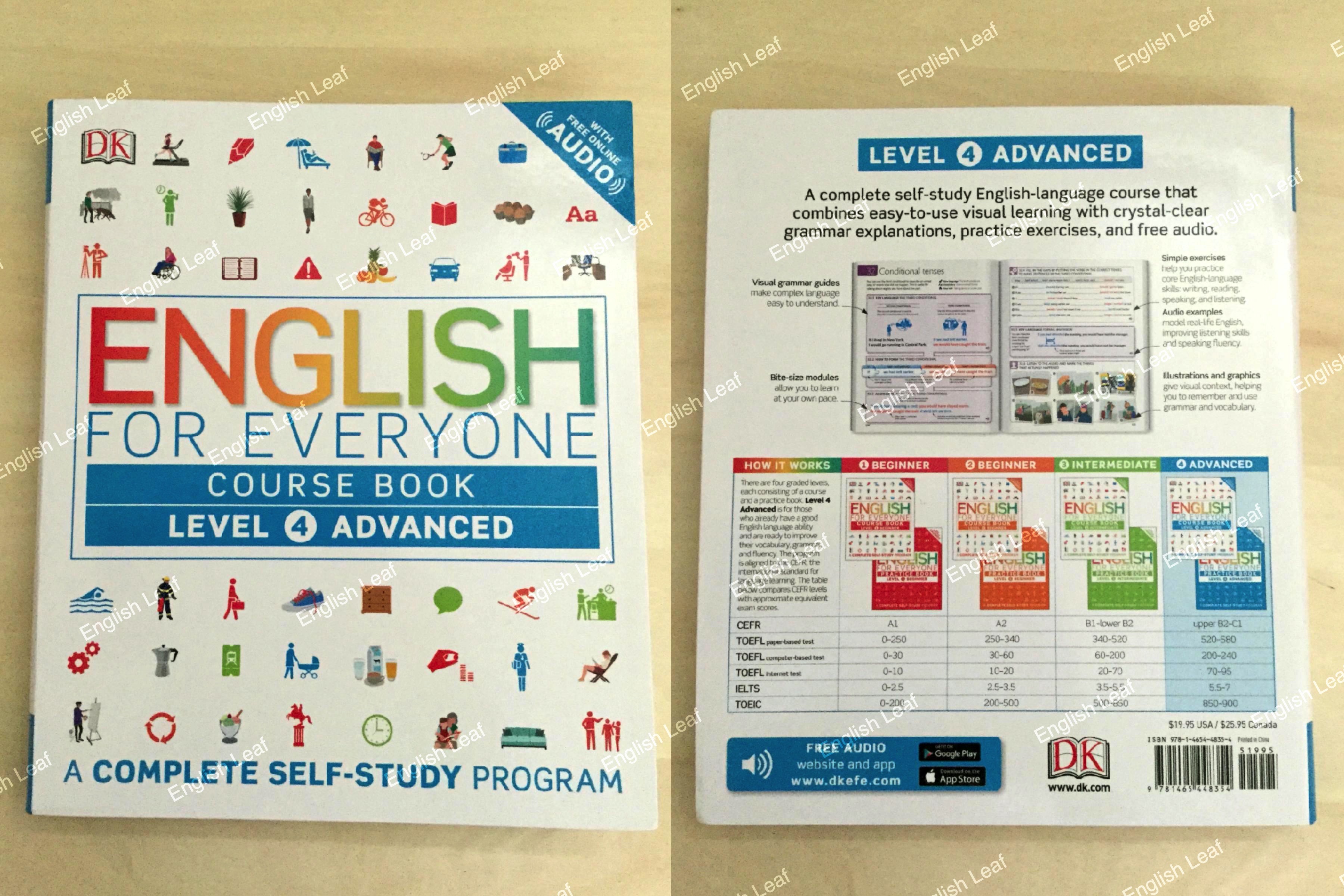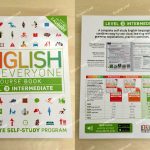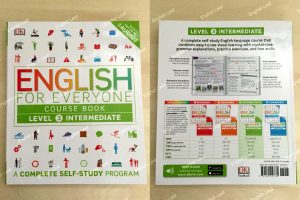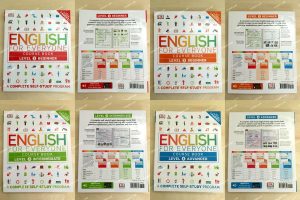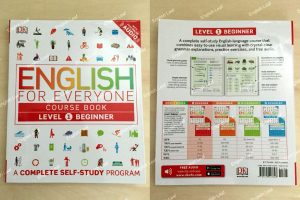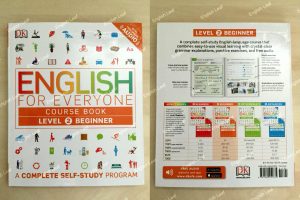英語は英語で学ぶ
「English for Level」シリーズのレベル4です。中級者~上級者向けの内容になっています。TOEFL・TOEICなど主要の英語試験に必要な語彙や文法、演習がカバーされています。本書の文章は全て英語で書かれており、英語を英語で学ぶことによって新しい気づきを得られます。
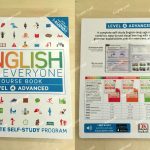
Author
Victoria Boobyer is a freelance writer, presenter, and teacher trainer with a background in English-language teaching and teacher management. She has a keen interest in the use of graded readers and the sound pedagogical use of technology in teachin.
Course consultant
Tim Bowen has taught English and trained teachers in more than 30 countries worldwide. He is the co-author of works on pronunciation teaching and language-teaching methodology, and author of numerous books for English-language teachers. He is currently a freelance materials writer, editor, and translator. He is a member of the Chartered Institute of Linguists.
Language consultant
Professor Susan Barduhn is an experienced English-language teacher, teacher trainer, and author, who has contributed to numerous publications. In addition to directing English-language courses in at least four different continents, she has been President of the International Association of Teachers of English as a Foreign Language, and an adviser to the British Council and the US State Department. She is currently a Professor at the School for International Training in Vermont, USA.
Penguin Random House
US Editors Allison Singer, Jenny Siklos
Editors Gareth Clark, Lisa Gillespie, Andrew Kerr-Jarrett
Art Editors Chrissy Barnard, Ray Bryant
Senior Art Editor Sharon Spencer
Editorial Assistants Jessica Cawthra, Sarah Edwards
Illustrators Edwood Burn, Denise Joos, Michael Parkin, Jemma Westing
Audio Producer Liz Hammond
Managing Editor Daniel Mills
Managing Art Editor Anna Hall
Project Manager Christine Stroyan
Jacket Designer Natalie Godwin
Jacket Editor Claire Gell
Jacket Design Development Manager Sophia MTT
Producer, Pre-Production Luca Frassinetti
Producer Mary Slater
Publisher Andrew Macintyre
Art Director Karen Self
Publishing Director Jonathan Metcalf
DK India
Jacket Designer Surabhi Wadhwa
Managing Jackets Editor Saloni Singh
Senior DTP Designer Harish Aggarwal
First American Edition, 2016 Published in the United States by DK Publishing 1450 Broadway, Suite 801, New York, NY 10018
Copyright © 2016 Dorling Kindersley Limited DK, a Division of Penguin Random House LLC 1920109876543 021-289759-Jun/2016
All rights reserved. Without limiting the rights under the copyright reserved above, no part of this publication may be reproduced, stored in or introduced into a retrieval system, or transmitted, in any form, or by any means (electronic, mechanical, photocopying, recording, or otherwise), without the prior written permission of the copyright owner. Published in Great Britain by Dorling Kindersley Limited.
A catalog record for this book is available from the Library of Congress. ISBN 978-1-4654-4835-4
DK books are available at special discounts when purchased in bulk for sales promotions, premiums, fund-raising, or educational use. For details, contact: DK Publishing Special Markets, 1450 Broadway, Suite 801, New York, NY 10018
Special Sales@dk.com
Printed and bound in China
All images © Dorling Kindersley Limited For further information see: www.dkimages.com
A WORLD OF IDEAS: SEE ALL THERE IS TO KNOW
www.dk.com
Contents
How the course works
01 Making conversation
New language Present tenses
Vocabulary Meeting new people
New skill Using question tags
02 Action and state verbs
New language State verbs in continuous forms
Vocabulary Action and state verbs
New skill Describing states
03 Using collocations
New language Collocations
Vocabulary Beliefs and opinions
New skill Talking about your life
04 Complex descriptions
New language General and specific adjectives
Vocabulary Personalities
New skill Ordering adjectives
05 Making general statements
New language Introductory “it”
Vocabulary Talents and abilities
New skill Expressing general truths
06 Vocabulary Travel and tourism
07 Phrasal verbs
New language Phrasal verbs overview
Vocabulary Travel
New skill Using complex phrasal verbs
08 Narrative tenses
New language The past perfect continuous
Vocabulary Travel adjectives and idioms
New skill Talking about a variety of past actions
09 Giving advice and opinions
New language Modals for advice and opinion
Vocabulary Recommendations
New skill Giving advice and opinions
10 Making predictions
New language Degrees of likelihood
Vocabulary Idioms about time
New skill Talking about possibilities
11 Vocabulary Family and relationships
12 Using discourse markers
New language Linking information
Vocabulary Family history
New skill Talking about relationships
13 Past habits and states
New language “Used to” and “would”
Vocabulary Family values
New skill Contrasting the past with the present
14 Comparing and contrasting
New language “As… as” comparisons
Vocabulary Adjective-noun collocations
New skill Comparing and contrasting
15 Two comparatives together
New language Two comparatives together
Vocabulary Age and population
New skill Expressing cause, effect, and change
16 Vocabulary Studying
17 Taking notes
New language Organizing information
Vocabulary Academic life
New skill Taking notes
18 Speaking approximately
New language Generalization
Vocabulary Approximate quantity phrases
New skill Talking about numbers
19 Changing emphasis
New language The passive voice
Vocabulary Online learning
New skill Changing sentence emphasis
20 Things that might happen
New language “What if” “suppose,” “in case”
Vocabulary Exams and assessment
New skill Talking about hypothetical situations
21 Vocabulary Working
22 Job applications
New language Prepositions and gerunds
Vocabulary Job applications
New skill Writing a résumé and cover letter
23 Asking polite questions
New language Direct and indirect questions
Vocabulary Job interviews
New skill Asking questions politely
24 Complex verb patterns
New language Verb + infintive / gerund
Vocabulary World of work
New skill Using complex verb patterns
25 Double object verbs
New language Double object verbs
Vocabulary New businesses
New skill Talking about starting a business
26 Vocabulary Meeting and presenting
27 Reflexive pronouns
New language Reflexive pronouns
Vocabulary Workplace language
New skill Talking about work issues
28 Meeting and planning
New language Combining verbs
Vocabulary Office tasks
New skill Taking part in meetings
29 Qualifying descriptions
New language Non-gradable adjectives
Vocabulary Qualifying words
New skill Adding detail to descriptions
30 Expressing purpose
New language “In order to,” “so that”
Vocabulary Language of apology
New skill Expressing purpose
31 Vocabulary Environmental concerns
32 Conditional tenses
New language The third conditional
Vocabulary Environmental threats
New skill Talking about an unreal past
33 Past regrets
New language Should have” and “ought to have
Vocabulary Time markers
New skill Expressing regret about the past
34 Actions and consequences
New language Dependent prepositions
Vocabulary Actions and consequences
New skill Changing sentence stress
35 Few or little?
New language “Few” “little,” “fewer,” “less”
Vocabulary Nature and environment
New skill Describing quantities
36 Vocabulary Tradition and superstition
37 Past possibility
New language “Might/may/ could” in the past
Vocabulary Urban myths
New skill Talking about past possibility
38 Speculation and deduction
New language More uses for modal verbs
Vocabulary Phrasal verbs with “out”
New skill Speculating and making deductions
39 Mixed conditionals
New language Mixed conditionals
Vocabulary Personality traits
New skill Talking about hypothetical situations
40 Adding “-ever” to question words
New language Words with “-ever”
Vocabulary Chance and weather phrases
New skill joining a clause to a sentence
41 Vocabulary Media and celebrity
42 Reporting with passives
New language Passive voice for reporting
Vocabulary Reporting language
New skill Distancing yourself from facts
43 Making indirect statements
New language Indirect statements
Vocabulary Hedging language
New skill Expressing uncertainty
44 Adding emphasis
New language Inversion after adverbials
Vocabulary Media and celebrity
New skill Adding emphasis to statements
45 Shifting focus
New language focusing with clauses
Vocabulary Phrases for emphasis
New skill Shifting focus
46 Vocabulary Crime and the law
47 Relative clauses
New language Relative clauses
Vocabulary Crime and criminals
New skill Specifying and elaborating
48 More relative clauses
New language Where, when, whereby, whose
Vocabulary Courtroom phrases
New skill Using relative words
49 Modal verbs in the future
New language “Will be able to.” “will have to”
Vocabulary Legal terms
New skill Expressing future ability and obligation
50 Modal verbs overview
New language Using modal verbs
Vocabulary Modal verbs
New skill Asking, offering, and predicting
51 Vocabulary Customs and cultures
52 Talking about groups
New language Using adjectives as nouns
Vocabulary Countries and nationalities
New skill Generalizing politely
53 Old and new situations
New language “Be used to” and “get used to”
Vocabulary Moving and living abroad
New skill Talking about old and new situations
54 Articles
New language Articles
Vocabulary Commonly misspelled words
New skill Saying words with silent letters
55 Abstract ideas
New language Concrete and abstract nouns
Vocabulary Education systems
New skill Talking about abstract ideas
56 Vocabulary Technology and the future
57 Future hopes
New language “Wish with “would” or “could”
Vocabulary Hopes for the future
New skill Talking about future hopes and wishes
58 The future continuous
New language The future continuous with “will”
Vocabulary Polite requests
New skill Planning your career
59 The future perfect
New language The future perfect
Vocabulary Life plans
New skill Making plans and predictions
60. The future in the past
New language “Would” and “was going to”
Vocabulary Changing plans
New skill Saving what you thought
61 Vocabulary Art and culture
62 Leaving words out
New language Ellipsis
Vocabulary Entertainment
New skill Leaving out unneccessary words
63 Substituting words
New language Substitution
Vocabulary Books and reading
New skill Replacing phrases
64 Shortening infinitives
New language Reduced infinitives
Vocabulary Music and performance
New skill Avoiding repetition
65 Expressing reactions
New language Informal discourse markers
Vocabulary Advanced prefixes
New skill Structuring conversation
66 Getting things done
New language “Have / get something done”
Vocabulary Services and repairs
New skill Describing things people do for you
67 Complex agreement
New language Complex agreement
Vocabulary Collective nouns
New skill Using the correct agreement
68 “So” and “such”
New language “So” and “such” for emphasis
Vocabulary Medical science
New skill Emphasizing descriptions
69 Using articles to generalize
New language Generic the
Vocabulary Exploration and invention
New skill Using advanced articles
Answers
Index
How the course works
English for Everyone is designed for people who want to teach themselves the English language. Like all language courses, it covers the core skills: grammar, vocabulary, pronunciation, listening, speaking, reading, and writing. Unlike in other courses, the skills are taught and practiced as visually as possible, using images and graphics to help you understand and remember. The best way to learn is to work through the book in order, making full use of the audio available on the website and app. Turn to the practice book at the end of each unit to reinforce your learning with additional exercises.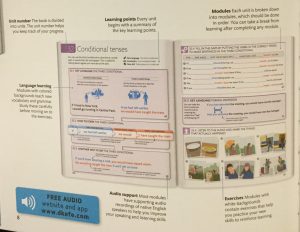
Unit number The book is divided into units. The unit number helps you keep track of your progress.
Learning points Every unit begins with a summary of the key learning points.
Modules Each unit is broken down into modules, which should be done in order. You can take a break from learning after completing any module.
Language learning Modules with colored backgrounds teach new vocabulary and grammar.
Study these carefully before moving on to the exercises.
Audio support Most modules have supporting audio recordings of native English speakers to help you improve your speaking and listening skills.
Exercises Modules with white backgrounds contain exercises that help you practice your new skills to reinforce learning.
FREE AUDIO
website and app
www.dkefe.com
Language modules
New language points are taught in carefully graded stages, starting with a simple explanation of when they are used, then offering further examples of common usage and a detailed breakdown of how key constructions are formed.
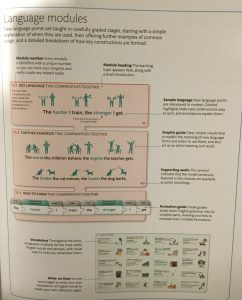
Module number Every module is identified with a unique number, so you can track your progress and easily locate any related audio.
Module heading The teaching topic appears here, along with a brief introduction.
Sample language New language points are introduced in context. Colored highlights make new constructions easy to spot, and annotations explain them.
Graphic guide Clear, simple visuals help to explain the meaning of new language forms and when to use them, and also act as an aid to learning and recall.
Supporting audio This symbol indicates that the model sentences featured in the module are available as audio recordings.
Formation guide Visual guides break down English grammar into its simplest parts, showing you how to recreate even complex formations.
Vocabulary Throughout the book, vocabulary modules list the most common and useful English words and phrases, with visual cues to help you remember them.
Write-on lines You are encouraged to write your own translations of English words to create your own reference pages.
Practice modules
Each exercise is carefully graded to drill and test the language taught in the corresponding course book units. Working through the exercises alongside the course book will help you remember what you have learned and become more fluent. Every exercise is introduced with a symbol to indicate which skill is being practiced.
GRAMMAR Apply new language rules in different contexts.
VOCABULARY Cement your understanding of key vocabulary.
SPEAKING Compare your spoken English to model audio recordings.
READING Examine target language in real-life English contexts.
LISTENING Test your understanding of spoken English
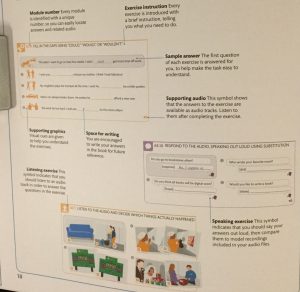
Module number Every module is identified with a unique number, so you can easily locate answers and related audio.
Exercise instruction Every exercise is introduced with a brief instruction, telling you what you need to do.
Sample answer the first question of each exercise is answered for you, to help make the task easy to understand.
Space for writing You are encouraged to write your answers in the book for future reference.
Supporting graphics Visual cues are given to help you understand the exercises.
Supporting audio This symbol shows that the answers to the exercise are available as audio tracks. Listen to them after completing the exercise.
Listening exercise This symbol indicates that you should listen to an audio track in order to answer the questions in the exercise.
Speaking exercise This symbol indicates that you should say your answers out loud, then compare them to model recordings included in your audio files.
Audio
English for Everyone features extensive supporting audio materials. You are encouraged to use them as much as you can, to improve your understanding of spoken English, and to make your own accent and pronunciation more natural. Each file can be played, paused, and repeated as often as you like, until you are confident you understand what has been said.
LISTENING EXERCISES This symbol indicates that you should listen to an audio track in order to answer the questions in the exercise.
SUPPORTING AUDIO This symbol indicates that extra audio material is available for you to listen to after completing the module.
FREE AUDIO website and app www.dkefe.com
Track your progress
The course is designed to make it easy to monitor your progress, with regular summary and review modules. Answers are provided for every exercise, so you can see how well you have understood each teaching point.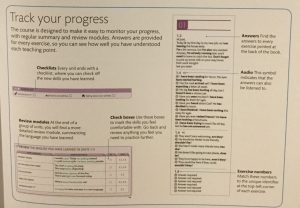
Checklists Every unit ends with a checklist, where you can check off the new skills you have learned.
Review modules At the end of a group of units, you will find a more detailed review module, summarizing the language you have learned.
Check boxes Use these boxes to mark the skills you feel comfortable with. Go back and review anything you feel you need to practice further.
Answers Find the answers to every exercise printed at the back of the book.
Exercise numbers Match these numbers to the unique identifier at the top-left corner of each exercise.
Audio This symbol indicates that the answers can also be listened to.

